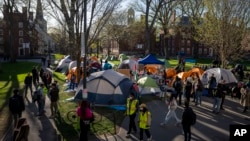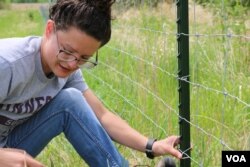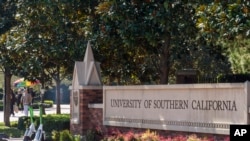Student Union
- By Esha Sarai
Millennial Farmer Runs for Office, Runs After Her Flock
On her 25th birthday, Brittney Johnson slept in until the luxurious hour of 7 a.m.
"I'm thrilled I'm officially a quarter of a century old today. Glad to have made it!" she laughed later, sipping lemon iced tea on the porch of her farmhouse, surrounded by irises.
Johnson planned to spend this birthday morning fixing the fencing around the farm to keep her sheep from breaking out. She bought the farmhouse, 40 acres, five ewes and one ram in her home state of Minnesota last year, shortly after her mother died, armed with a degree in plant science from the University of Minnesota, and months in rural Senegal and northern India on scholarships to learn more about agriculture around the world.
The biggest challenge to being younger, she says, is getting capital to maintain the property. So to keep the farm afloat, Johnson works two jobs: full time as an irrigation technician in a nearby town and part time at a farm supply store in another town. Then she comes home to make sure her flock is fed, safe and sheared.
While she would be justified in putting her feet up and resting after that, she feels a responsibility to her community to help local farmers who are just as stretched, just as hard working.
So she's running for a seat in the Minnesota State House of Representatives.
Partly motivated by the love for her community and partly because she's become keenly aware of the struggles faced by the local farming community, she campaigns in her extra hours, she said, to represent the many farmers who are in the same situation as she is.
"You just see so many people who have to work two or three jobs like 60-70 hours a week just to afford the basics," she said.
Struggling for the American dream
According to the U.S. Department of Agriculture (USDA), net profits of farms are down for the fourth year in a row, cut almost in half since 2013. The median income of farmers in the United States has effectively remained flat since 2015, even decreasing slightly when accounting for inflation, according to the USDA's Farm Income Forecast released in February.
"I think in America we have this ethic of 'If you work really hard you should be able to get ahead.' That's like the American dream, right? But for a lot of people they're working really hard and they still can't get ahead and that dream is gone," she said. "And you know I want to get it back and that's why I'm running."
Improving access to affordable health care for farmers in her area, who mostly have to buy extremely expensive plans in the individual market, is one of the first issues she said she would tackle if elected.
"I would love to be able to farm full time," she said. "One of the challenges we face is the affordability of our health care."
Johnson also cited the divisive political climate across the United States, which she says has led people in her area to feel forgotten by their representatives.
Her goal in St. Paul, she says would be "re-establishing those relationships between people and people who are supposed to represent them."
Meanwhile, she sees her age as an advantage in the busy mix between the farm, the jobs and the race.
"You've got to do a lot of physical work, and I feel like I have more energy now than I might later, so that's good I've got that on my side," she said, noting that there are fewer new farmers entering the field. Older farmers nearby have been willing to help teach and guide her.
But does it get lonely?
Not when she is enthusiastically greeted by her golden retriever, Mumford, two cats, and Hillary, her seemingly most social ewe, whether she's entering her house, walking the pasture, or coming up the driveway.
"What a great way to come home!" she said, patting Hillary on the woolly head.
See all News Updates of the Day
US remains top choice for Indian students going abroad

About 69% of Indian students traveling abroad for their studies chose the United States, according to a Oxford International’s Student Global Mobility Index. Other popular choices were the United Kingdom, Canada and Australia.
Education Times reports the main influencers for deciding where to study abroad – for Indian students and others – were parents. (April 2024)
Malaysian official: Schools can’t turn away from global tensions

Zambry Abdul Kadir, Malaysia’s higher education minister, said protests spreading across universities in the United States show that schools can’t ignore political tensions.
Helen Packer, reporting in Times Higher Education, said the minister reminded educators that universities are key in the development of leaders, individuals and societies. (April 2024)
Social media breaks are difficult, but necessary

Between online classes, maintaining social connections and working on projects, college students can have a hard time disengaging from the demands of technology.
In Florida International University’s PantherNOW, Ariana Rodriguez offers strategies for taking a break from social media. (April 2024)
- By Melos Ambaye
Many master's degrees aren't worth the investment, research shows

Nearly half of master's degrees have a negative financial return, according to new research by the Foundation for Research on Equal Opportunity, an economic research organization.
The study indicates that many graduate degree programs do not increase lifetime earnings enough to be worth it.
While 23% of bachelor’s degree programs yield a negative financial return on investment, 43% of two-year degrees and master’s degrees fail to deliver a return, according to the study by Preston Cooper, a senior fellow at FREOPP.
Cooper assessed the return on investment for 53,000 degree and certificate programs to determine whether a student’s lifetime earnings outweigh program costs and the risk of not completing their degree.
His findings show that a student’s field of study was the overriding indicator of return on investment at the undergraduate and graduate level.
Engineering, computer science and nursing bachelor’s degrees have high financial returns on investment, while programs in education, fine arts, psychology and English usually have low returns.
Graduate degrees in medicine and law tend to have strong payoffs. But a large share of master’s programs, including the MBA, frequently have low payoffs, according to Cooper.
Although workers with master’s degrees earn 16% more than those with only bachelor’s degrees, Cooper says the figure fails to account for students who had “higher preexisting earnings potential.”
“MBA students typically have high preexisting earnings potential, having often chosen high-ROI undergraduate majors such as finance and economics,” Cooper writes. “So the MBA adds little value on top of that.”
The study indicates that high starting salaries are predictors of high returns on investment. Degrees with starting salaries of $57,000 a year or more deliver the best lifetime returns.
But the return on investment of a degree can vary depending on the educational institution.
“Students interested in fields with low average pay can still find some schools that do well transforming those fields of study into high-paying careers,” Cooper writes.
The quality of an institution also matters, said William Tierney, professor emeritus of higher education at the University of Southern California.
“An MBA from Harvard is a likely ticket to a good job,” Tierney told VOA. “An MBA from the University of Phoenix, less so.”
But students pursue graduate programs for more than just financial reasons.
“Some degrees open up careers in fields that students may enjoy, such as in the performing arts,” Robert Kelchen, head of educational leadership at the University of Tennessee, Knoxville, told VOA.
“Others can help gain access to social networks or simply help students learn about a topic that is of interest,” Kelchen added.
Cooper told VOA that it might make sense for students in degree programs with low returns on investment to switch majors if they can still graduate on time.
He found the worst outcome for a student’s return on investment is dropping out of college “because they must pay for one or more years’ tuition and spend time out of the labor force.”
Lawmakers who fund higher education have a responsibility in ensuring “higher education delivers on its promise of economic mobility,” Cooper said.
Nearly a third of federal funding, including Pell grants and student loans, pays for higher education programs that fail to provide students with a return on investment, according to the study.
Cooper’s view is that “some schools should shut down low-ROI programs and reallocate institutional resources to programs with a better return.”
“There's definitely this narrative out there that higher education is always worth it, and you should always try to get that extra degree because it will increase your earnings,” he told VOA. “That's reinforced by colleges who make lofty promises regarding their graduate degree programs' outcomes, which all too often fall short.”
Harvard students end protest as school agrees to discuss Gaza conflict

Protesters against the war between Israel and Hamas were voluntarily taking down their tents in Harvard Yard on Tuesday after university officials agreed to discuss their questions about the endowment, bringing a peaceful end to the kinds of demonstrations that were broken up by police on other campuses.
The student protest group Harvard Out of Occupied Palestine said in a statement that the encampment "outlasted its utility with respect to our demands." Meanwhile, Harvard University interim President Alan Garber agreed to pursue a meeting between protesters and university officials regarding the students' questions.
Students at many college campuses this spring set up similar encampments, calling for their schools to cut ties with Israel and businesses that support it.
The Israel-Hamas war began when Hamas and other militants stormed into southern Israel on October 7, killing some 1,200 people and taking 250 hostages. Palestinian militants still hold about 100 captives, and Israel's military has killed more than 35,000 people in Gaza, according to Gaza's Health Ministry, which doesn't distinguish between civilians and combatants.
Harvard said its president and the dean of the Faculty of Arts and Sciences, Hopi Hoekstra, will meet with the protesters to discuss the conflict in the Middle East.
The protesters said they worked out an agreement to meet with university officials, including the Harvard Management Company, which oversees the world's largest academic endowment, valued at about $50 billion.
The protesters' statement said the students will set an agenda that includes discussions on disclosure, divestment, reinvestment and the creation of a Center for Palestine Studies. The students also said that Harvard has offered to retract suspensions of more than 20 students and student workers and back down on disciplinary measures faced by 60 more.
"Since its establishment three weeks ago, the encampment has both broadened and deepened Palestine solidarity organizing on campus," a spokesperson for the protesters said. "It has moved the needle on disclosure and divestment at Harvard."
















